Nadawt Ul Ulema
The Nadwa’s Ulemas Attempted to Make a Synthesis of Aligarh and Deoband
- Need For Nadwa- Background
- Division of Muslims b/w modern and orthodox
- Aligarh and Deoband
- The modern stood for “reason”, believe in western science and knowledge
- The orthodox chased the door of “Ijatahad”
- Some religious scholars rose to occasion that were equipped with Islamic knowledge besides wisdom and reason.
Establishment Of Nadwa
- Ashraf Ali Thanvi, Mehmood-ul-Hasan.
- First session at Kanpoor
- Named after a hall in March
Aims and Objectives
- To counter the effect of Deoband and Aligarh
- Synthesis of modern and classical education
- To address the prevailing situation and problem in the light of Quran and Sunnah
- Changes in the syllabus of theologian institutions
Achievements of Nadwa
- Huge achievements in spite of financial difficulties and shortage of time
- Many religious Scholars joined Nadwa and number of students became scholars
- Religious Scholars
- Scholars who had knowledge of Quran and Hadith besides prevailing problems
- Ambassadors b/w two communities
- Bridging The Gap B/W Two Groups
- The approach of Nadwa
- The approach and role of Allama Shibli Nomani
- Production Of Finest Islamic Literature
- Guiding the Muslims To True Islam
- Synthesis Of Modern And Classical Education
- Role In Pakistan Movement
- Better Understanding With Government
- Aims And Objectives To strike the balance
- Synthesis of modern and classical education
- To address the problems of Muslims
- Improvement in syllabi
“There was a common view that there were three tendencies among Muslims, the first one was Deoband;pro-religious and anti-British; the second was that of Aligarh;pro-England and anti- congress and third was that of Nadwa; pro-British and anti-Aligarh and anti Deoband.”
